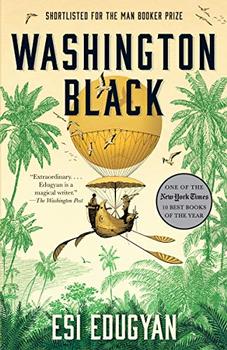Summary | Excerpt | Reading Guide | Reviews | Beyond the Book | Readalikes | Genres & Themes | Author Bio

It was then, I believe now, that Big Kit determined, calmly and with love, to kill herself and me.
2
All my childhood I'd had no one; only Big Kit, as she was known in the cane. I loved her and I feared her.
I was around five years old when I angered the quarters-woman and was sent to live in the brutal hut below the dead palm tree, Kit's hut. On my first evening there, my supper was stolen and my wooden bowl cracked; I was struck hard on the side of my head by a man I did not know, so that I staggered and could not hear. Two little girls spat on me. Their ancient grandmother held me down with her talons biting into my arms and cut my handmade sandals from my feet for the leather.
That was when I first heard Big Kit's voice.
"Not this one," she said softly.
That was all. But then some monstrous charge of dark energy, huge, inexorable as a breaker, poured towards us and picked the old woman up by the hair as though she were a boneless scrap of rag, tossing her aside. I stared, terrified. Big Kit just glared down at me with her orange eyes, as if disgusted, and then returned to her stool in the dark corner.
But in the morning I found her squatting beside me in the pale light. She offered her bowl of mash, traced the lines in my palm. "You will have great big life, child," she murmured. "Life of many rivers." And then she spat in my hand and closed my fist so that the spit ran between my knuckles. "That is first river, right there," she said, starting to laugh.
I adored her. She towered over everyone, huge, fierce. Because of her size and because she was a Saltwater, a witch in old Dahomey before being taken, she was feared. She would sow curses into the dirt beds under the huts. Rooks would be found eviscerated, hanging in doorways. For three weeks she forcibly took food from a strong smith's apprentice each morning and night and ate it in front of him, scooping with her fingers from his bowl, until some understanding was reached between them. In the smouldering fields she would glisten as if oiled, tearing up the wretched earth, humming strange songs under her breath, her flesh rippling. Some nights in the huts she would murmur in her sleep, in the low, thick language of her kingdom, and cry out. No one ever spoke of that, and in the fields the next day she would be all scorched fury, like a blunt axe, wrecking as much as she reaped. Her true name, she once told me, whispering, was Nawi. She had had three sons. She had had one son. She had had no sons, not even a daughter. Her stories changed with the moon. I remember how, some days, at sunrise, she would sprinkle a handful of dirt over her blade and murmur some incantation, her voice husky, as though overcome with emotion. I loved that voice, its rough music. She would suck air through her teeth and squint up her eyes and begin, "When I was royal guard at Dahomey," or "After I crush the antelope with my hands, like this," and I would stop whatever task was at hand, and stand listening in wonder. For she was a marvel, witness to a world I could not imagine, beyond the reach of the huts and the vicious fields of Faith.
Faith itself darkened under our new master. In the second week, he dismissed the old overseers. In their place arrived rough men from the docks, tattooed, red-faced, grimacing at the heat. These were ex-soldiers or old slavers or just island poor, with their papers crushed into a pocket and the sunken eyes of devils. Then the maimings began. What use could we be, injured so? I saw men limp into the fields, blood streaming down their legs; I saw women with blood-soaked bandages over their ears. Edward had his tongue cut out for backtalk; Elizabeth was forced to eat from a full chamber pot for not cleaning the previous day's thoroughly. James tried to run away, and to make an example of him, the master had an overseer burn him alive as we watched. Afterwards, in the embers of his pyre, an iron was heated and we filed past the charred horror of him, one by one, and were branded a second time.
Excerpted from Washington Black by Esi Edugyan. Copyright © 2018 by Esi Edugyan. All rights reserved. No part of this excerpt may be reproduced or reprinted without permission in writing from the publisher.




A classic is a book that has never finished saying what it has to say
Click Here to find out who said this, as well as discovering other famous literary quotes!
Your guide toexceptional books
BookBrowse seeks out and recommends the best in contemporary fiction and nonfiction—books that not only engage and entertain but also deepen our understanding of ourselves and the world around us.